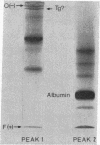Abstract
Butanol-insoluble iodinated compounds in the urine of patients with congenital goiters have been generally regarded as iodopeptides. Monoiodohistidine (MIH) and diiodohistidine (DIH) were identified from the urine of four patients with congenital goitrous hypothyroidism. From radioiodine studies, 40-70% of the urinary radioactivity was in the iodide-free fraction from which about 40% was identified as MIH and DIH by crystallizations to a constant specific activity.
Iodotyrosines were simultaneously identified in the urine. However the presence of an iodotyrosine-deiodinase activity was demonstrated in the two removed goiters with a normal Km for MIT. In vivo iodotyrosine deiodination was normal for hypothyroid subjects.
No thyroglobulin was identified in the thyroids from these patients. The major iodoprotein was iodoalbumin which, after in vivo labeling, contained 84-89% of the total soluble protein radioactivity. The thyroxine content of the goiter iodoalbumins and other iodoproteins was extremely low.
Iodohistidines were identified in comparable proportions in the iodoalbumin and in the other iodoproteins isolated from each goiter. The average iodohistidine content of these proteins as crystallizable MIH and DIH was in the individual cases 15 and 4% of the in vivo incorporated radioiodine. DIH was identified in all iodoprotein fractions. The mean DIH/MIH ratios from the individual cases were 1.16 and 0.35. The corresponding DIT/MIT ratios were 3.19 and 1.45, respectively.
The major consequence of this thyroglobulin defect is the iodination of inappropriate proteins (mainly albumin) resulting in low yields of thyroxine and high yields of iodohistidines. Iodohistidines from the goiter iodoproteins were not deiodinated and, at least for MIH, were quantitatively excreted in the urine of these patients. From the MIH iodoalbumin content and the MIH urinary excretion, goiter iodoalbumin turnover estimates were made and, although elevated, could not maintain a normal thyroxine secretion.
The urinary excretion of iodohistidines easily demonstrated by column chromatography is offered as a test for detecting this variety of congenital goiter.
Full text
PDF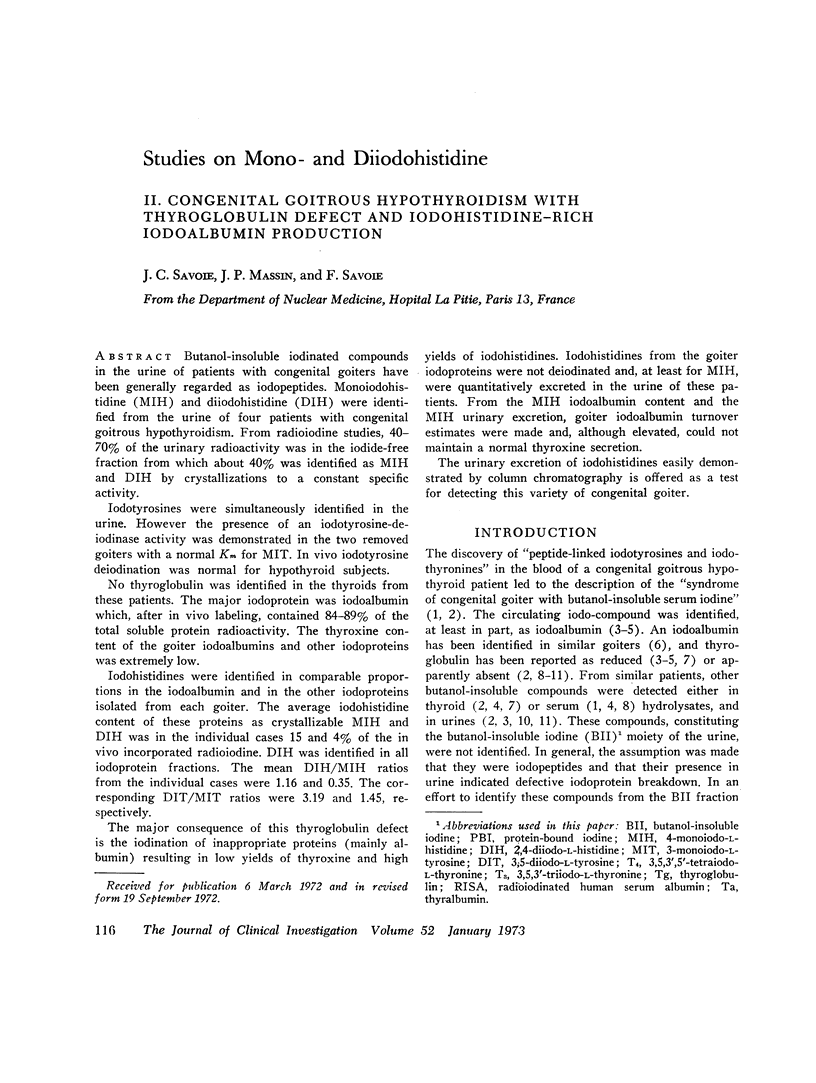
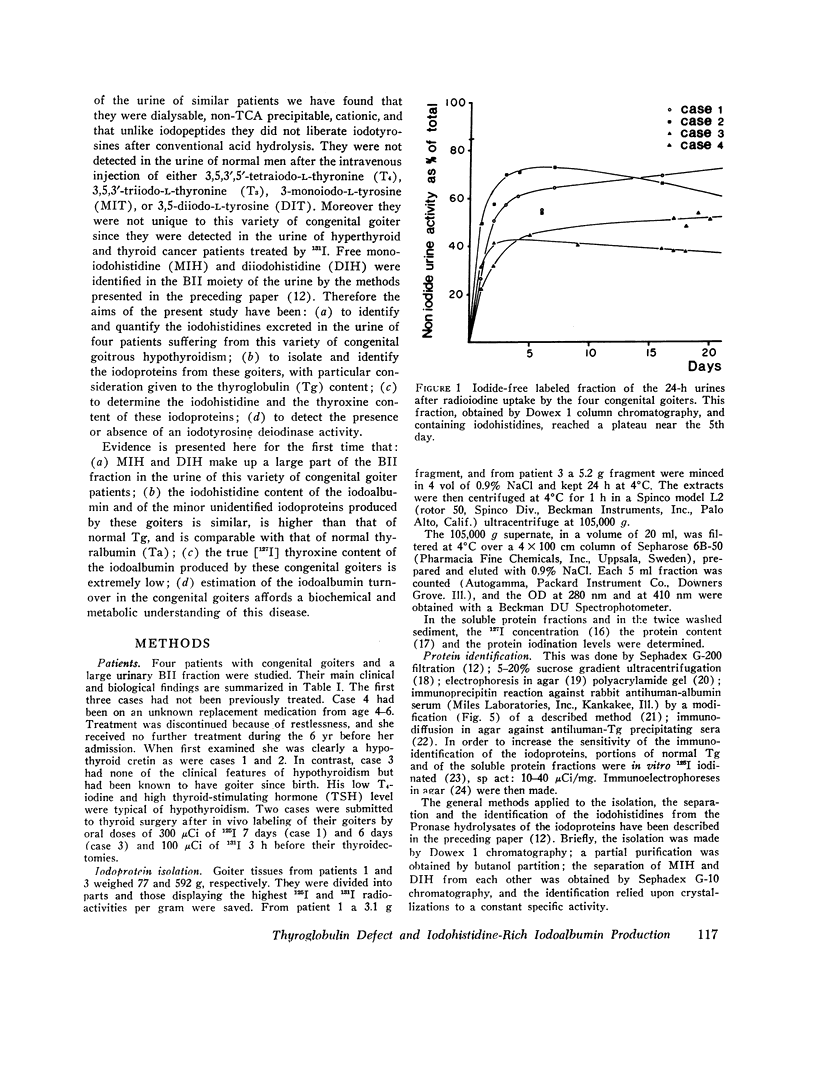
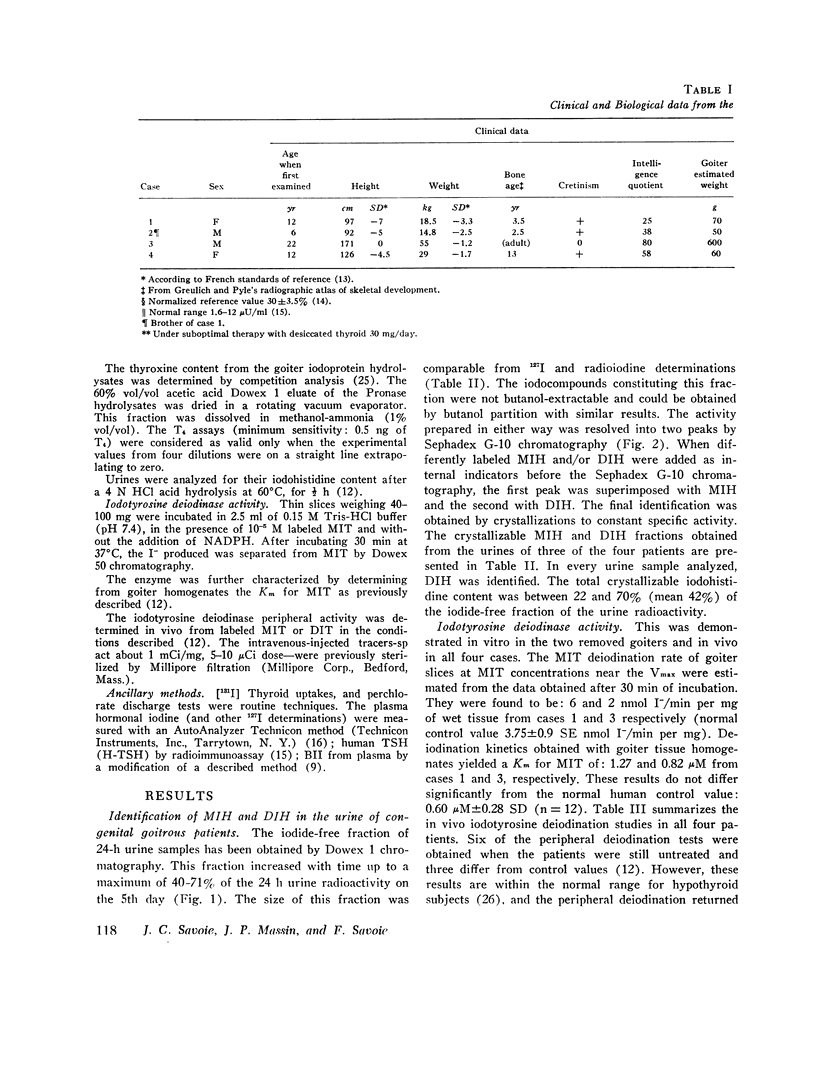
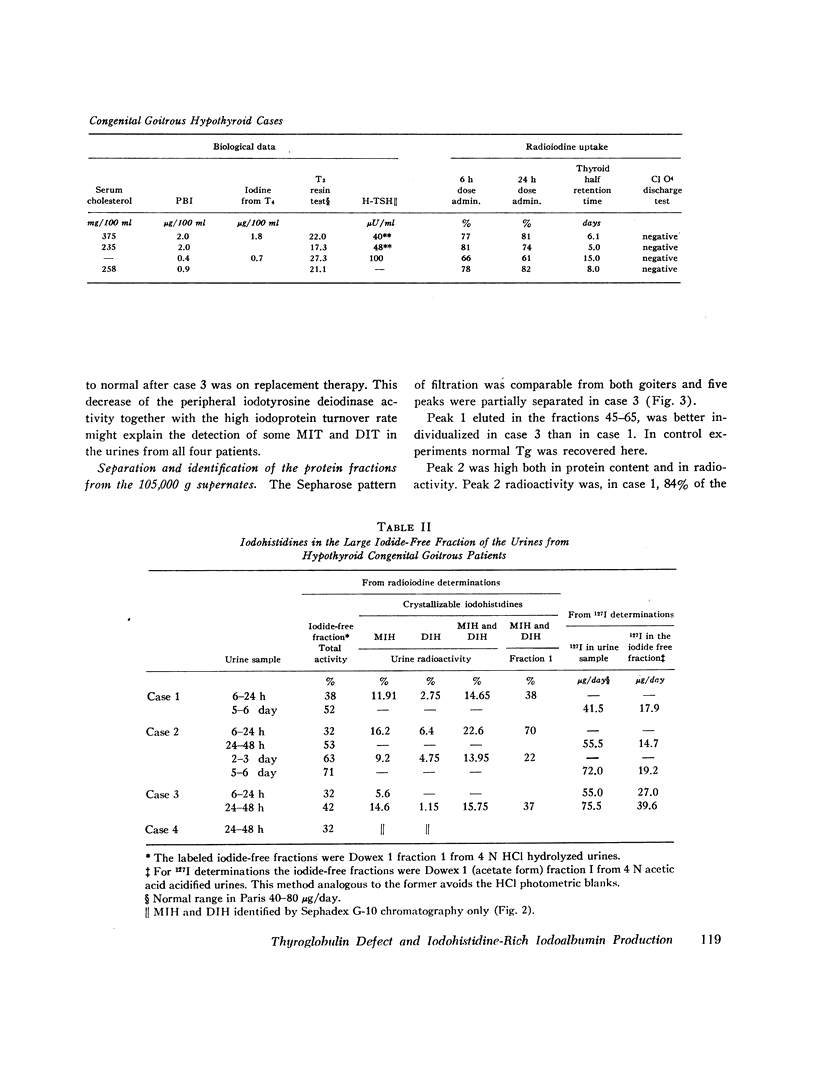
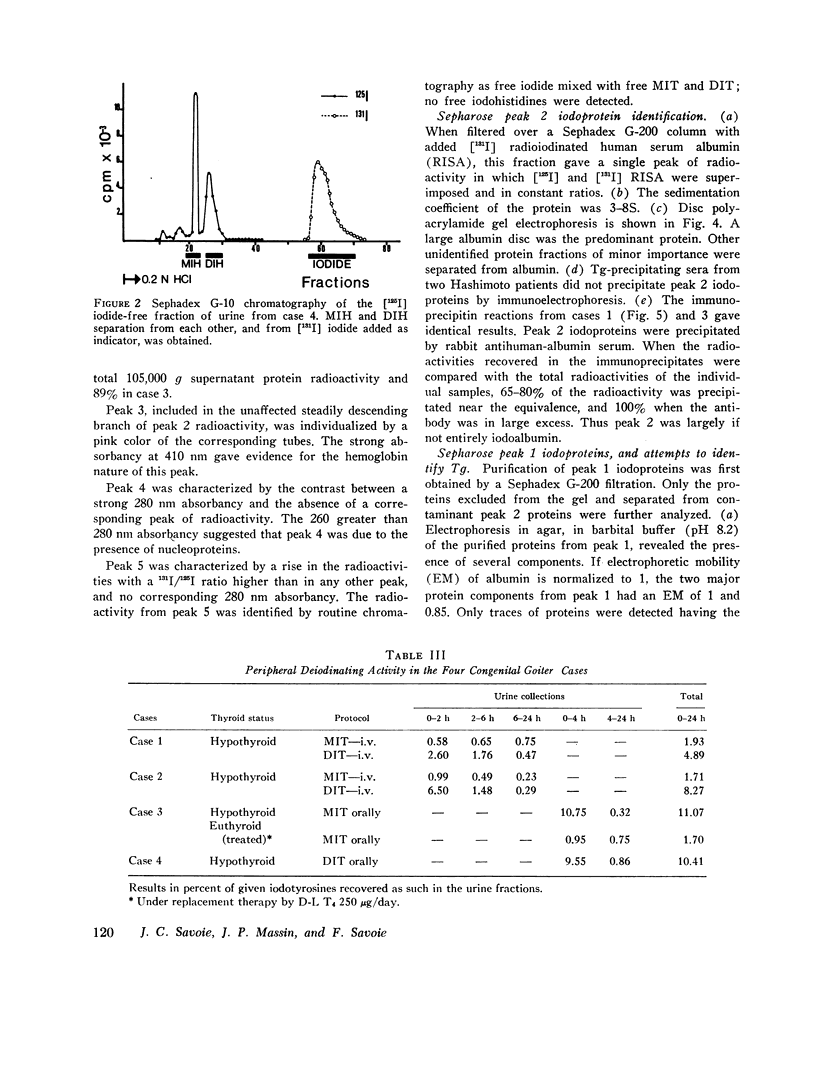
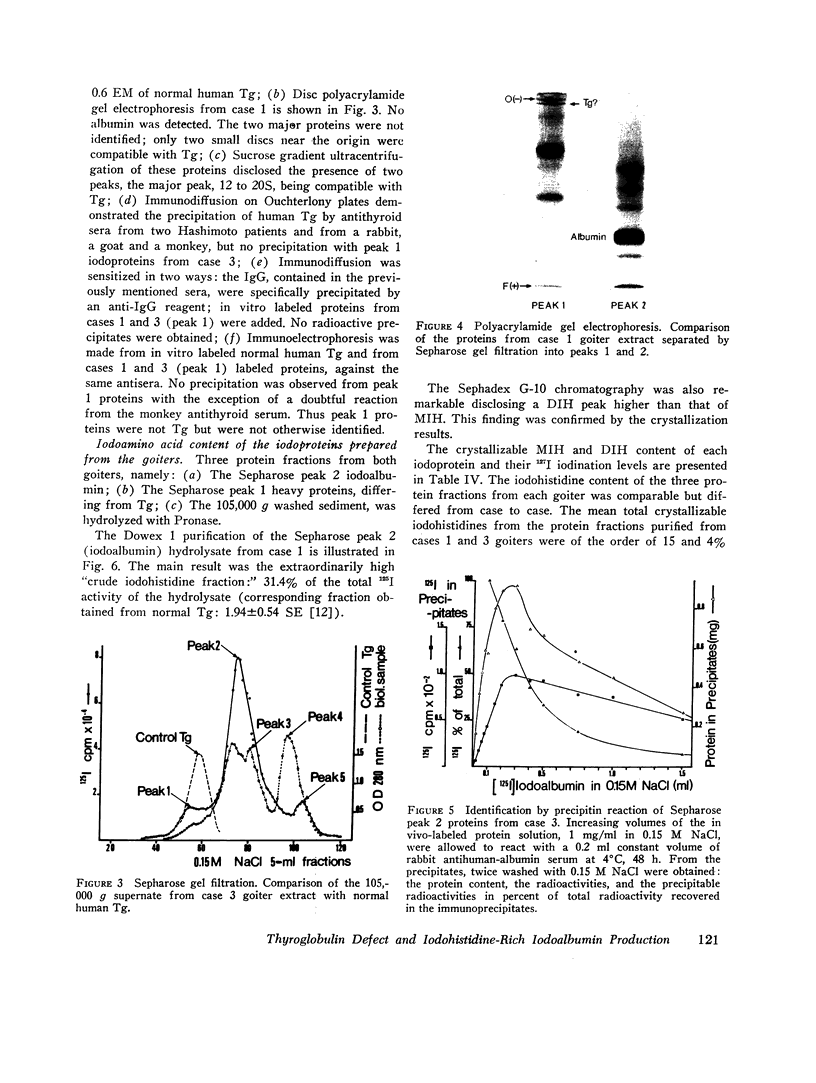
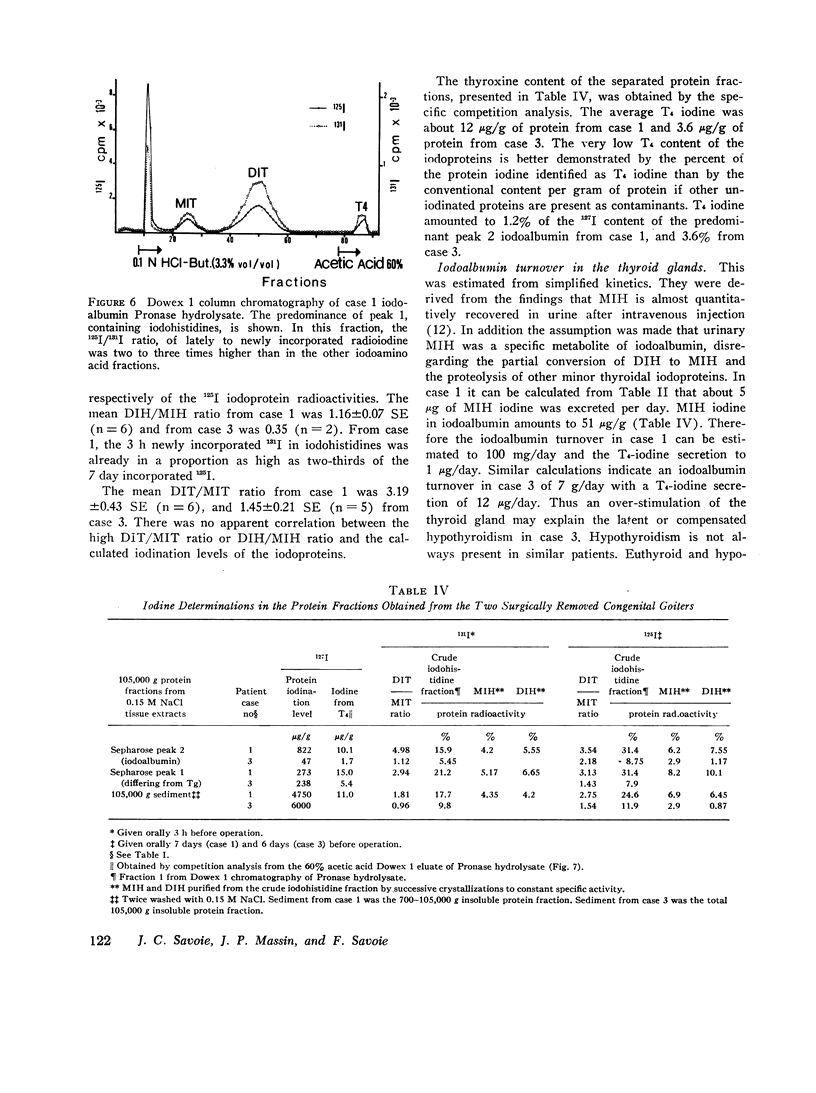
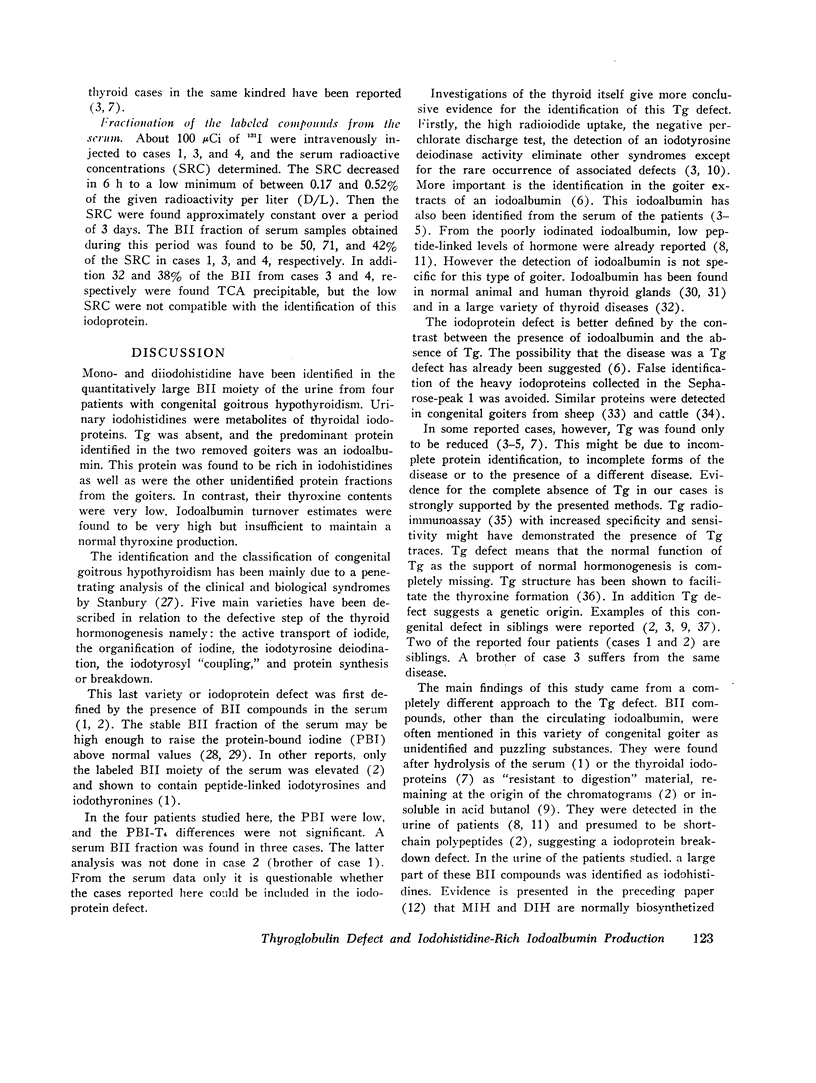
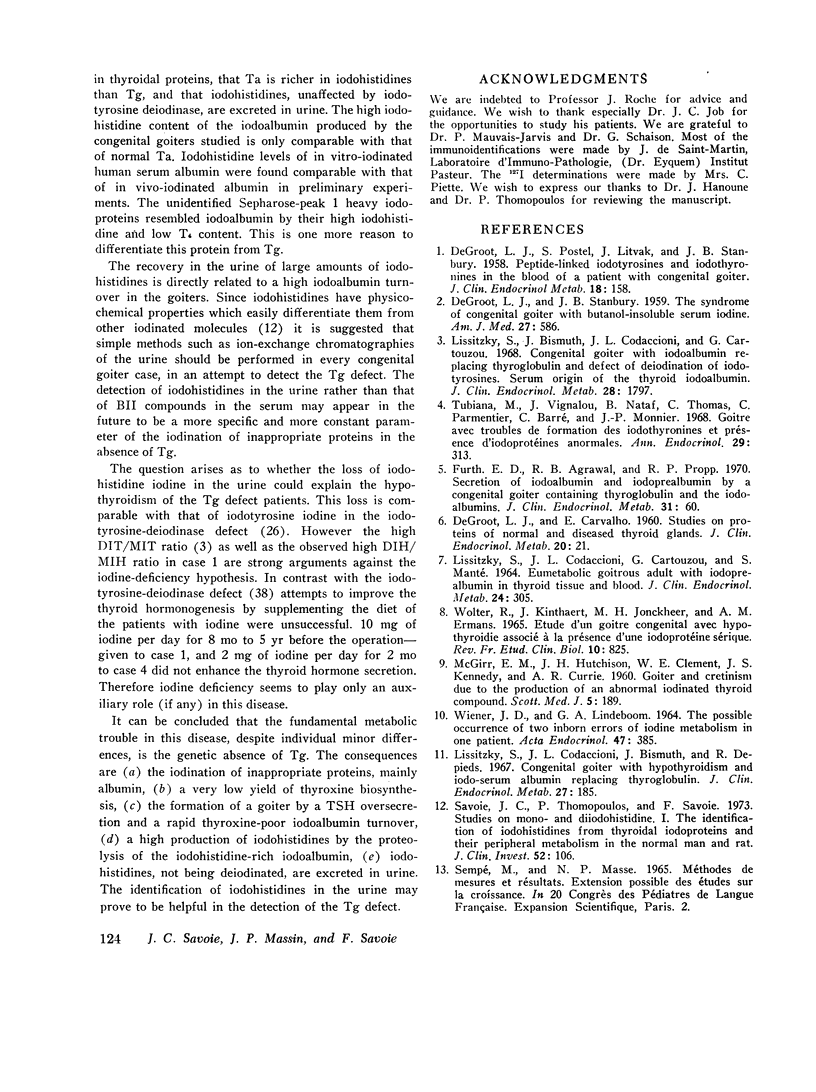
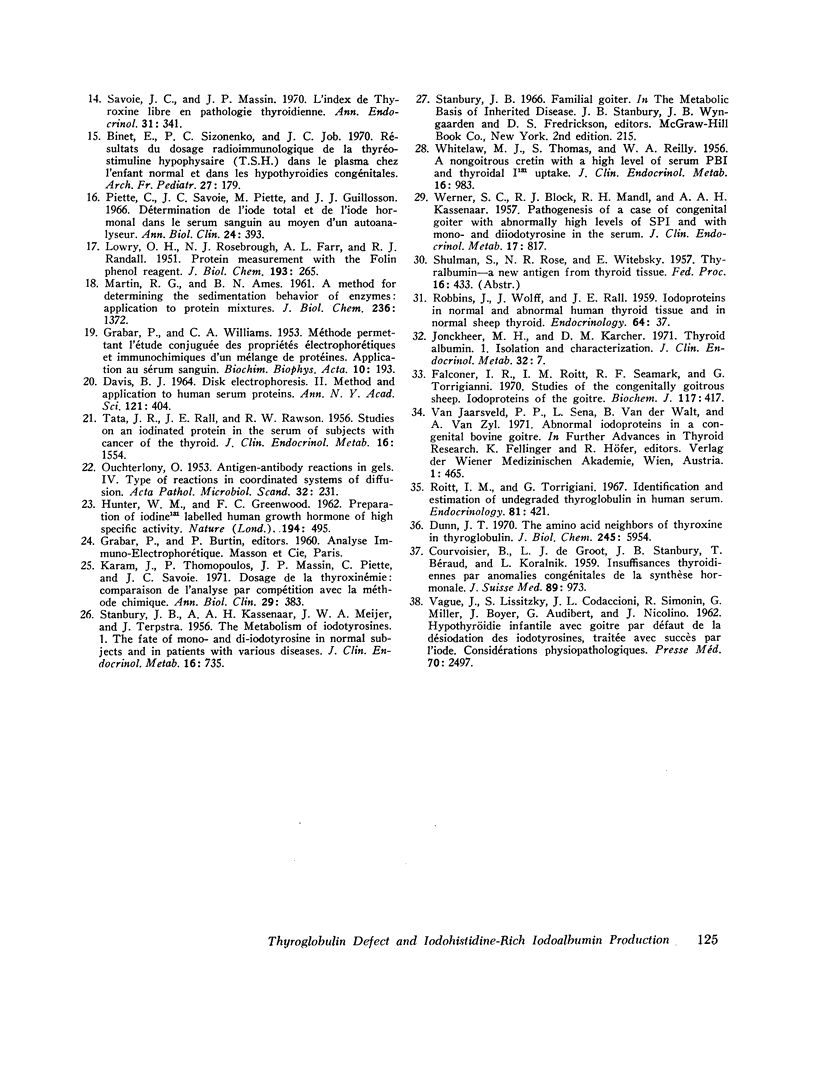
Images in this article
Selected References
These references are in PubMed. This may not be the complete list of references from this article.
- COURVOISIER B., DE GROOT L. J., STANBURY J. B., BERAUD T., KORALNIK L. [Thyroid insufficiency caused by congenital anomaly of hormonal synthesis]. Schweiz Med Wochenschr. 1959 Sep 19;89:973–980. [PubMed] [Google Scholar]
- DAVIS B. J. DISC ELECTROPHORESIS. II. METHOD AND APPLICATION TO HUMAN SERUM PROTEINS. Ann N Y Acad Sci. 1964 Dec 28;121:404–427. doi: 10.1111/j.1749-6632.1964.tb14213.x. [DOI] [PubMed] [Google Scholar]
- DEGROOT L. J., CARVALHO E. Studies on proteins of normal and diseased thyroid glands. J Clin Endocrinol Metab. 1960 Jan;20:21–34. doi: 10.1210/jcem-20-1-21. [DOI] [PubMed] [Google Scholar]
- DEGROOT L. J., POSTEL S., LITVAK J., STANBURY J. B. Peptide-linked iodotyrosines and iodothyronines in the blood of a patient with congenital goiter. J Clin Endocrinol Metab. 1958 Feb;18(2):158–166. doi: 10.1210/jcem-18-2-158. [DOI] [PubMed] [Google Scholar]
- DEGROOT L. J., STANBURY J. B. The syndrome of congenital goiter with butanol-insoluble serum iodine. Am J Med. 1959 Oct;27:586–595. doi: 10.1016/0002-9343(59)90044-0. [DOI] [PubMed] [Google Scholar]
- Dunn J. T. The amino acid neighbors of thyroxine in thyroglobulin. J Biol Chem. 1970 Nov 25;245(22):5954–5961. [PubMed] [Google Scholar]
- Falconer I. R., Roitt I. M., Seamark R. F., Torrigiani G. Studies on the congenitally goitrous sheep. Iodoproteins of the goitre. Biochem J. 1970 Apr;117(3):417–424. doi: 10.1042/bj1170417. [DOI] [PMC free article] [PubMed] [Google Scholar]
- Furth E. D., Agrawal R. B., Propp R. P. Secretion of iodoalbumin and iodoprealbumin by a congenital goiter containing thyroglobulin and the iodoalbumins. J Clin Endocrinol Metab. 1970 Jul;31(1):60–69. doi: 10.1210/jcem-31-1-60. [DOI] [PubMed] [Google Scholar]
- GRABAR P., WILLIAMS C. A. Méthode permettant l'étude conjuguée des proprietés électrophorétiques et immunochimiques d'un mélange de protéines; application au sérum sanguin. Biochim Biophys Acta. 1953 Jan;10(1):193–194. doi: 10.1016/0006-3002(53)90233-9. [DOI] [PubMed] [Google Scholar]
- HUNTER W. M., GREENWOOD F. C. Preparation of iodine-131 labelled human growth hormone of high specific activity. Nature. 1962 May 5;194:495–496. doi: 10.1038/194495a0. [DOI] [PubMed] [Google Scholar]
- Jonckheer M. H., Karcher D. M. Thyroid albumin. I. Isolation and purification. J Clin Endocrinol Metab. 1971 Jan;32(1):7–17. doi: 10.1210/jcem-32-1-7. [DOI] [PubMed] [Google Scholar]
- Karam J., Thomopoulos P., Massin J. P., Piette C., Savoie J. C. Dosage de la thyroxinémie: comparaison de l'analyse par compétition avec la méthode chimique. Ann Biol Clin (Paris) 1971;29(5):383–391. [PubMed] [Google Scholar]
- LISSITZKY S., CODACCIONI J. L., CARTOUZOU G., MANTE S. EUMETABOLIC GOITROUS ADULT WITH IODOPREALBUMIN IN THYROID TISSUE AND BLOOD. J Clin Endocrinol Metab. 1964 Apr;24:305–312. doi: 10.1210/jcem-24-4-305. [DOI] [PubMed] [Google Scholar]
- LOWRY O. H., ROSEBROUGH N. J., FARR A. L., RANDALL R. J. Protein measurement with the Folin phenol reagent. J Biol Chem. 1951 Nov;193(1):265–275. [PubMed] [Google Scholar]
- Lissitzky S., Bismuth J., Codaccioni J. L., Cartouzou G. Congenital goiter with iodoalbumin replacing thyroglobulin and defect of deiodination of iodotyrosines. Serum origin of the thyroid iodoalbumin. J Clin Endocrinol Metab. 1968 Dec;28(12):1797–1806. doi: 10.1210/jcem-28-12-1797. [DOI] [PubMed] [Google Scholar]
- Lissitzky S., Codaccioni J. L., Bismuth J., Depieds R. Congenital goiter with hypothyroidism and iodo-serum albumin replacing thyroglobulin. J Clin Endocrinol Metab. 1967 Feb;27(2):185–196. doi: 10.1210/jcem-27-2-185. [DOI] [PubMed] [Google Scholar]
- MARTIN R. G., AMES B. N. A method for determining the sedimentation behavior of enzymes: application to protein mixtures. J Biol Chem. 1961 May;236:1372–1379. [PubMed] [Google Scholar]
- Piette C., Savoie J. C., Piette M., Guillosson J. J. Détermination de l'iode total et de l'iode hormonal dans le sérum sanguin au moyen d'un autoanalyseur. Ann Biol Clin (Paris) 1966 Mar-Apr;24(3):393–404. [PubMed] [Google Scholar]
- RALL J. E., RAWSON R. W., TATA J. R. Studies on an iodinated protein in the serum of subjects with cancer of the thyroid. J Clin Endocrinol Metab. 1956 Dec;16(12):1554–1569. doi: 10.1210/jcem-16-12-1554. [DOI] [PubMed] [Google Scholar]
- ROBBINS J., WOLFF J., RALL J. E. Iodoproteins in normal and abnormal human thyroid tissue and in normal sheep thyroid. Endocrinology. 1959 Jan;64(1):37–52. doi: 10.1210/endo-64-1-37. [DOI] [PubMed] [Google Scholar]
- Roitt I. M., Torrigiani G. Identification and estimation of undegraded thyroglobulin in human serum. Endocrinology. 1967 Sep;81(3):421–429. doi: 10.1210/endo-81-3-421. [DOI] [PubMed] [Google Scholar]
- STANBURY J. B., KASSENAAR A. A., MEIJER J. W. The metabolism of iodotyrosines. I. The fate of mono- and di-iodotyrosine in normal subjects and in patients with various diseases. J Clin Endocrinol Metab. 1956 Jun;16(6):735–746. doi: 10.1210/jcem-16-6-735. [DOI] [PubMed] [Google Scholar]
- Savoie J. C., Massin J. P. L'index de thyroxine libre en pathologie thyroïdienne. Ann Endocrinol (Paris) 1970 May-Jun;31(3):341–349. [PubMed] [Google Scholar]
- Savoie J. C., Thomopoulos P., Savoie F. Studies on mono- and diiodohistidine. I. The identification of iodohistidines from thyroidal iodoproteins and their peripheral metabolism in the normal man and rat. J Clin Invest. 1973 Jan;52(1):106–115. doi: 10.1172/JCI107153. [DOI] [PMC free article] [PubMed] [Google Scholar]
- Tubiana M., Vignalou J., Nataf B., Thomas C., Parmentier C., Barre C., Monnier J. P. Goitre avec troubles de formation des iodothyronines et présence d'iodoprotéines anormales. Ann Endocrinol (Paris) 1968 May-Jun;29(3):313–329. [PubMed] [Google Scholar]
- WERNER S. C., BLOCK R. J., MANDL R. H., KASSENAAR A. A. Pathogenesis of a case of congenital goiter with abnormally high levels of SPI and with mono- and diiodotyrosine in the serum. J Clin Endocrinol Metab. 1957 Jul;17(7):817–831. doi: 10.1210/jcem-17-7-817. [DOI] [PubMed] [Google Scholar]
- WIENER J. D., LINDEBOOM G. A. THE POSSIBLE OCCURRENCE OF TWO INBORN ERRORS OF IODINE METABOLISM IN ONE PATIENT. Acta Endocrinol (Copenh) 1964 Nov;47:385–401. doi: 10.1530/acta.0.0470385. [DOI] [PubMed] [Google Scholar]
- Wolter R., Kinthaert J., Jonckheer M. H., Ermans A. M. Etude d'un goitre congénital avec hypothyroidie, associé à la présence d'une iodoprotéine sérique. Rev Fr Etud Clin Biol. 1965 Oct;10(8):825–832. [PubMed] [Google Scholar]



